Indian Migrant Ordinance and Wages: Sri Lanka Plantation Workers Study
VerifiedAdded on 2020/10/05
|15
|4373
|202
Report
AI Summary
This research report investigates the impact of the Indian migrant ordinance law and the minimum wages ordinance law on the rights of Indian immigrant plantation workers in Sri Lanka. It provides a detailed introduction to the historical context, research background, aims, objectives, and research questions. The study examines the legal frameworks and their effectiveness in protecting the rights of these workers, focusing on issues of human rights, fair wages, and working conditions. The methodology outlines the research approach, including data collection methods and analysis. The literature review explores existing research on the topic, including the Indian Emigration Act of 1922 and its impact on worker recruitment and conditions. The report analyzes the effects of minimum wage laws and suggests reforms for better human rights protection. The report also addresses the limitations of the study and concludes with recommendations for future research and policy improvements. This study aims to provide a comprehensive understanding of the legal and social issues faced by Indian immigrant plantation workers in Sri Lanka and to propose solutions for improving their living and working conditions.
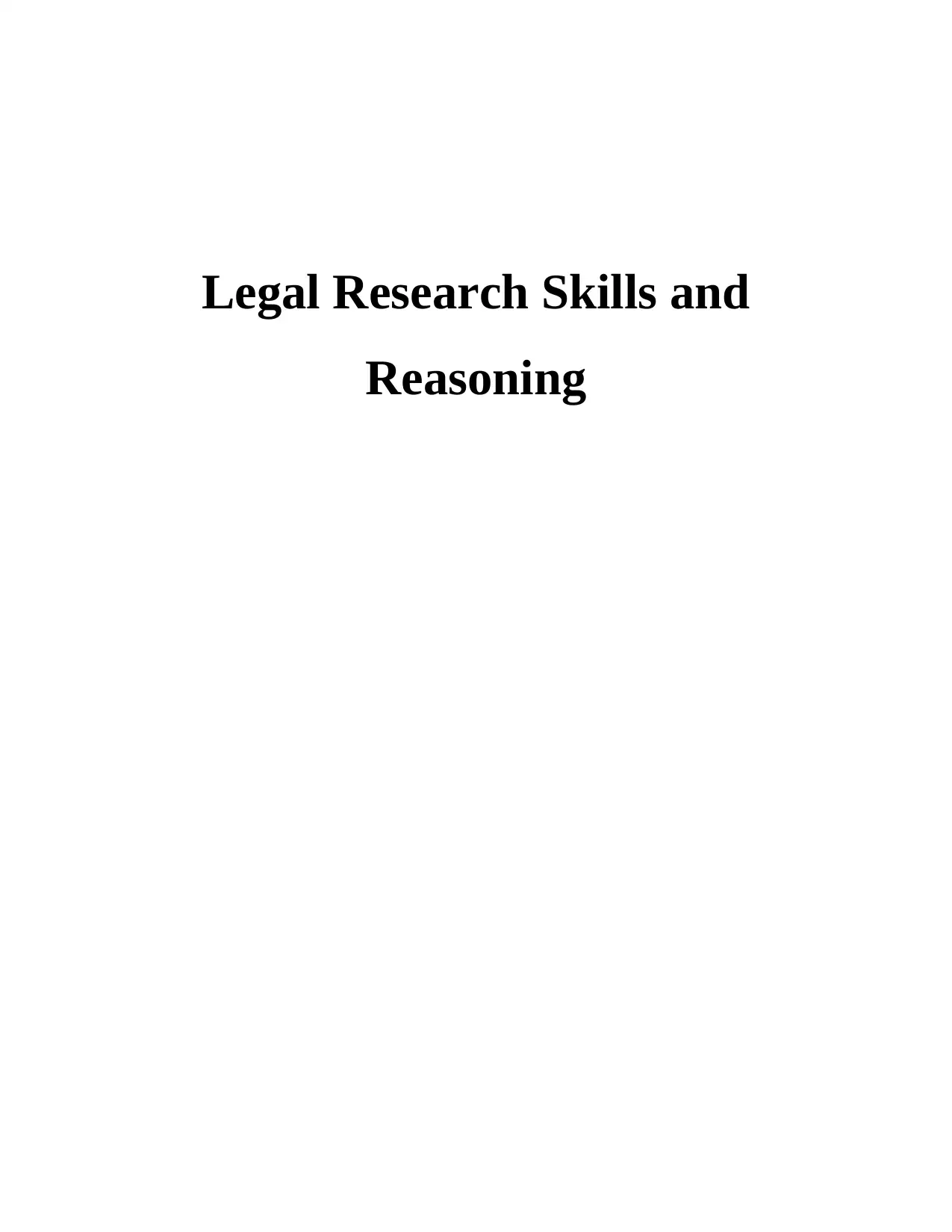
Legal Research Skills and
Reasoning
Reasoning
Paraphrase This Document
Need a fresh take? Get an instant paraphrase of this document with our AI Paraphraser
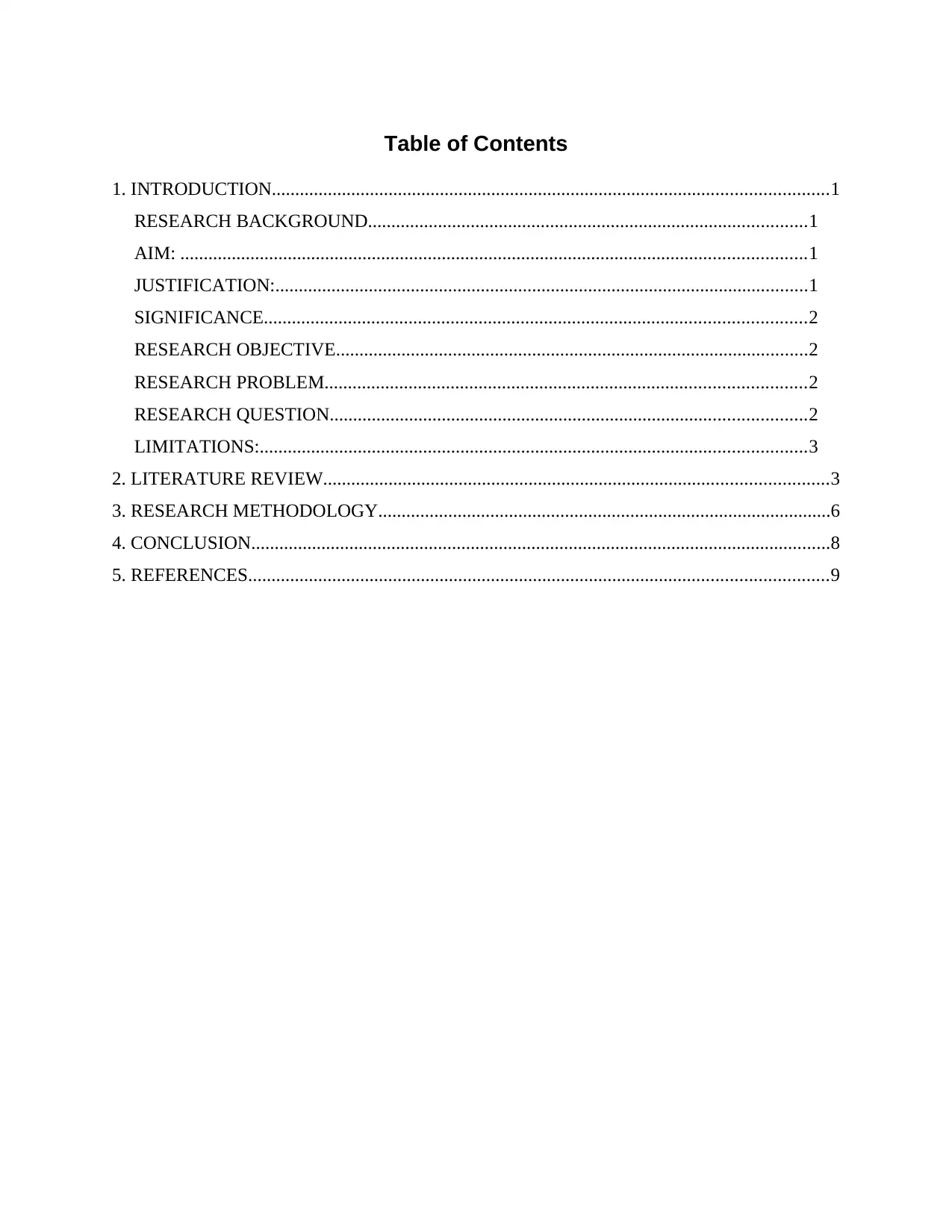
Table of Contents
1. INTRODUCTION.......................................................................................................................1
RESEARCH BACKGROUND..............................................................................................1
AIM: ......................................................................................................................................1
JUSTIFICATION:..................................................................................................................1
SIGNIFICANCE....................................................................................................................2
RESEARCH OBJECTIVE.....................................................................................................2
RESEARCH PROBLEM.......................................................................................................2
RESEARCH QUESTION......................................................................................................2
LIMITATIONS:.....................................................................................................................3
2. LITERATURE REVIEW............................................................................................................3
3. RESEARCH METHODOLOGY.................................................................................................6
4. CONCLUSION............................................................................................................................8
5. REFERENCES............................................................................................................................9
1. INTRODUCTION.......................................................................................................................1
RESEARCH BACKGROUND..............................................................................................1
AIM: ......................................................................................................................................1
JUSTIFICATION:..................................................................................................................1
SIGNIFICANCE....................................................................................................................2
RESEARCH OBJECTIVE.....................................................................................................2
RESEARCH PROBLEM.......................................................................................................2
RESEARCH QUESTION......................................................................................................2
LIMITATIONS:.....................................................................................................................3
2. LITERATURE REVIEW............................................................................................................3
3. RESEARCH METHODOLOGY.................................................................................................6
4. CONCLUSION............................................................................................................................8
5. REFERENCES............................................................................................................................9
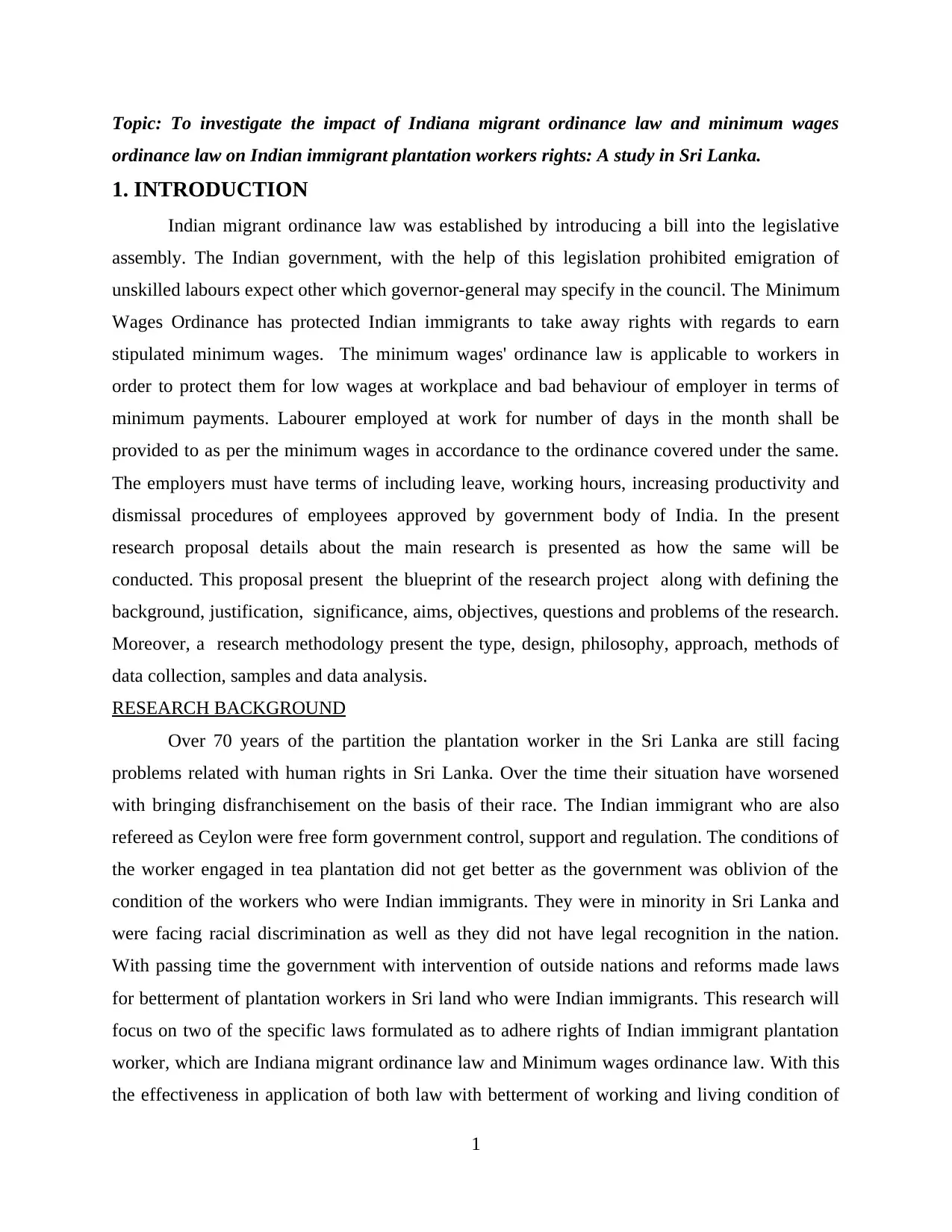
Topic: To investigate the impact of Indiana migrant ordinance law and minimum wages
ordinance law on Indian immigrant plantation workers rights: A study in Sri Lanka.
1. INTRODUCTION
Indian migrant ordinance law was established by introducing a bill into the legislative
assembly. The Indian government, with the help of this legislation prohibited emigration of
unskilled labours expect other which governor-general may specify in the council. The Minimum
Wages Ordinance has protected Indian immigrants to take away rights with regards to earn
stipulated minimum wages. The minimum wages' ordinance law is applicable to workers in
order to protect them for low wages at workplace and bad behaviour of employer in terms of
minimum payments. Labourer employed at work for number of days in the month shall be
provided to as per the minimum wages in accordance to the ordinance covered under the same.
The employers must have terms of including leave, working hours, increasing productivity and
dismissal procedures of employees approved by government body of India. In the present
research proposal details about the main research is presented as how the same will be
conducted. This proposal present the blueprint of the research project along with defining the
background, justification, significance, aims, objectives, questions and problems of the research.
Moreover, a research methodology present the type, design, philosophy, approach, methods of
data collection, samples and data analysis.
RESEARCH BACKGROUND
Over 70 years of the partition the plantation worker in the Sri Lanka are still facing
problems related with human rights in Sri Lanka. Over the time their situation have worsened
with bringing disfranchisement on the basis of their race. The Indian immigrant who are also
refereed as Ceylon were free form government control, support and regulation. The conditions of
the worker engaged in tea plantation did not get better as the government was oblivion of the
condition of the workers who were Indian immigrants. They were in minority in Sri Lanka and
were facing racial discrimination as well as they did not have legal recognition in the nation.
With passing time the government with intervention of outside nations and reforms made laws
for betterment of plantation workers in Sri land who were Indian immigrants. This research will
focus on two of the specific laws formulated as to adhere rights of Indian immigrant plantation
worker, which are Indiana migrant ordinance law and Minimum wages ordinance law. With this
the effectiveness in application of both law with betterment of working and living condition of
1
ordinance law on Indian immigrant plantation workers rights: A study in Sri Lanka.
1. INTRODUCTION
Indian migrant ordinance law was established by introducing a bill into the legislative
assembly. The Indian government, with the help of this legislation prohibited emigration of
unskilled labours expect other which governor-general may specify in the council. The Minimum
Wages Ordinance has protected Indian immigrants to take away rights with regards to earn
stipulated minimum wages. The minimum wages' ordinance law is applicable to workers in
order to protect them for low wages at workplace and bad behaviour of employer in terms of
minimum payments. Labourer employed at work for number of days in the month shall be
provided to as per the minimum wages in accordance to the ordinance covered under the same.
The employers must have terms of including leave, working hours, increasing productivity and
dismissal procedures of employees approved by government body of India. In the present
research proposal details about the main research is presented as how the same will be
conducted. This proposal present the blueprint of the research project along with defining the
background, justification, significance, aims, objectives, questions and problems of the research.
Moreover, a research methodology present the type, design, philosophy, approach, methods of
data collection, samples and data analysis.
RESEARCH BACKGROUND
Over 70 years of the partition the plantation worker in the Sri Lanka are still facing
problems related with human rights in Sri Lanka. Over the time their situation have worsened
with bringing disfranchisement on the basis of their race. The Indian immigrant who are also
refereed as Ceylon were free form government control, support and regulation. The conditions of
the worker engaged in tea plantation did not get better as the government was oblivion of the
condition of the workers who were Indian immigrants. They were in minority in Sri Lanka and
were facing racial discrimination as well as they did not have legal recognition in the nation.
With passing time the government with intervention of outside nations and reforms made laws
for betterment of plantation workers in Sri land who were Indian immigrants. This research will
focus on two of the specific laws formulated as to adhere rights of Indian immigrant plantation
worker, which are Indiana migrant ordinance law and Minimum wages ordinance law. With this
the effectiveness in application of both law with betterment of working and living condition of
1
⊘ This is a preview!⊘
Do you want full access?
Subscribe today to unlock all pages.

Trusted by 1+ million students worldwide
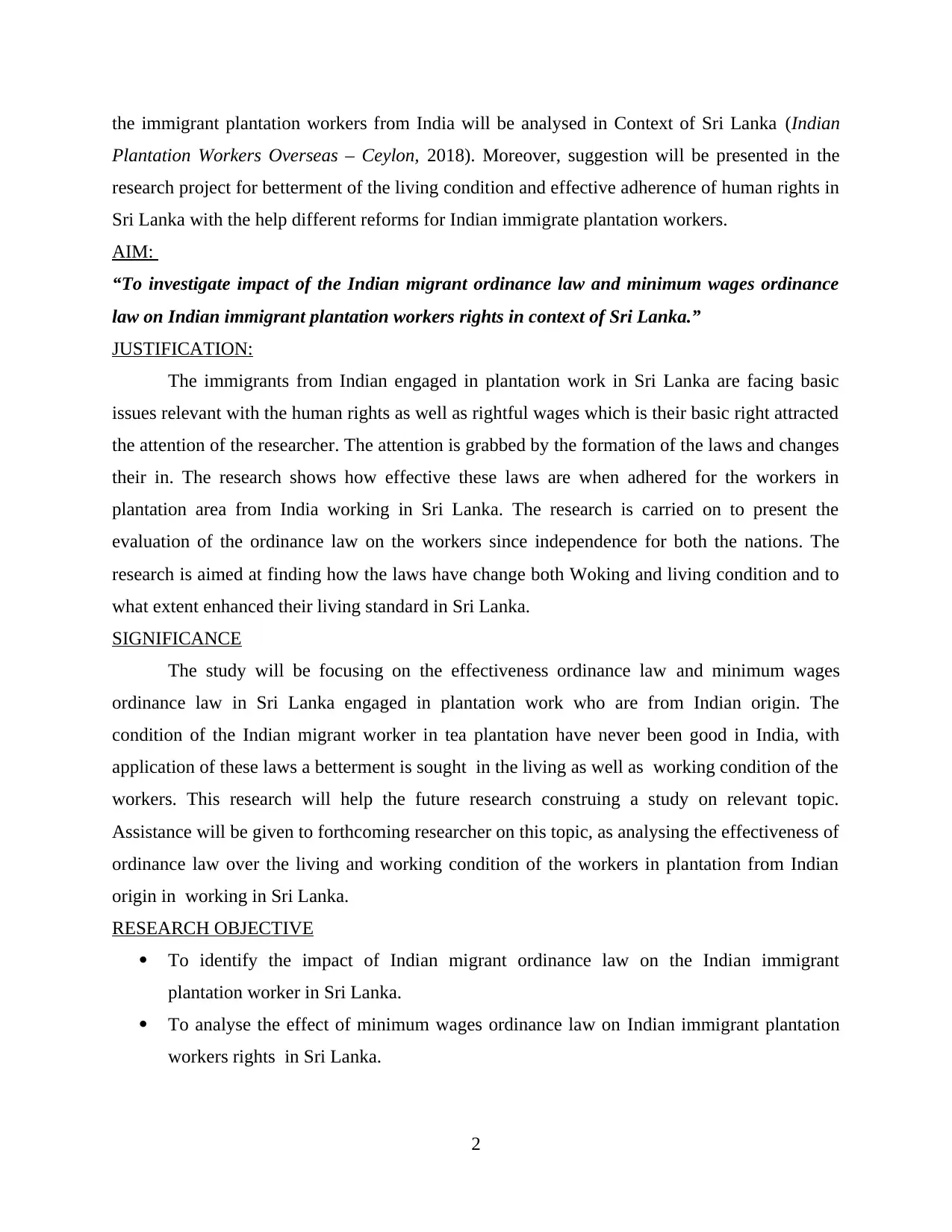
the immigrant plantation workers from India will be analysed in Context of Sri Lanka (Indian
Plantation Workers Overseas – Ceylon, 2018). Moreover, suggestion will be presented in the
research project for betterment of the living condition and effective adherence of human rights in
Sri Lanka with the help different reforms for Indian immigrate plantation workers.
AIM:
“To investigate impact of the Indian migrant ordinance law and minimum wages ordinance
law on Indian immigrant plantation workers rights in context of Sri Lanka.”
JUSTIFICATION:
The immigrants from Indian engaged in plantation work in Sri Lanka are facing basic
issues relevant with the human rights as well as rightful wages which is their basic right attracted
the attention of the researcher. The attention is grabbed by the formation of the laws and changes
their in. The research shows how effective these laws are when adhered for the workers in
plantation area from India working in Sri Lanka. The research is carried on to present the
evaluation of the ordinance law on the workers since independence for both the nations. The
research is aimed at finding how the laws have change both Woking and living condition and to
what extent enhanced their living standard in Sri Lanka.
SIGNIFICANCE
The study will be focusing on the effectiveness ordinance law and minimum wages
ordinance law in Sri Lanka engaged in plantation work who are from Indian origin. The
condition of the Indian migrant worker in tea plantation have never been good in India, with
application of these laws a betterment is sought in the living as well as working condition of the
workers. This research will help the future research construing a study on relevant topic.
Assistance will be given to forthcoming researcher on this topic, as analysing the effectiveness of
ordinance law over the living and working condition of the workers in plantation from Indian
origin in working in Sri Lanka.
RESEARCH OBJECTIVE
To identify the impact of Indian migrant ordinance law on the Indian immigrant
plantation worker in Sri Lanka.
To analyse the effect of minimum wages ordinance law on Indian immigrant plantation
workers rights in Sri Lanka.
2
Plantation Workers Overseas – Ceylon, 2018). Moreover, suggestion will be presented in the
research project for betterment of the living condition and effective adherence of human rights in
Sri Lanka with the help different reforms for Indian immigrate plantation workers.
AIM:
“To investigate impact of the Indian migrant ordinance law and minimum wages ordinance
law on Indian immigrant plantation workers rights in context of Sri Lanka.”
JUSTIFICATION:
The immigrants from Indian engaged in plantation work in Sri Lanka are facing basic
issues relevant with the human rights as well as rightful wages which is their basic right attracted
the attention of the researcher. The attention is grabbed by the formation of the laws and changes
their in. The research shows how effective these laws are when adhered for the workers in
plantation area from India working in Sri Lanka. The research is carried on to present the
evaluation of the ordinance law on the workers since independence for both the nations. The
research is aimed at finding how the laws have change both Woking and living condition and to
what extent enhanced their living standard in Sri Lanka.
SIGNIFICANCE
The study will be focusing on the effectiveness ordinance law and minimum wages
ordinance law in Sri Lanka engaged in plantation work who are from Indian origin. The
condition of the Indian migrant worker in tea plantation have never been good in India, with
application of these laws a betterment is sought in the living as well as working condition of the
workers. This research will help the future research construing a study on relevant topic.
Assistance will be given to forthcoming researcher on this topic, as analysing the effectiveness of
ordinance law over the living and working condition of the workers in plantation from Indian
origin in working in Sri Lanka.
RESEARCH OBJECTIVE
To identify the impact of Indian migrant ordinance law on the Indian immigrant
plantation worker in Sri Lanka.
To analyse the effect of minimum wages ordinance law on Indian immigrant plantation
workers rights in Sri Lanka.
2
Paraphrase This Document
Need a fresh take? Get an instant paraphrase of this document with our AI Paraphraser
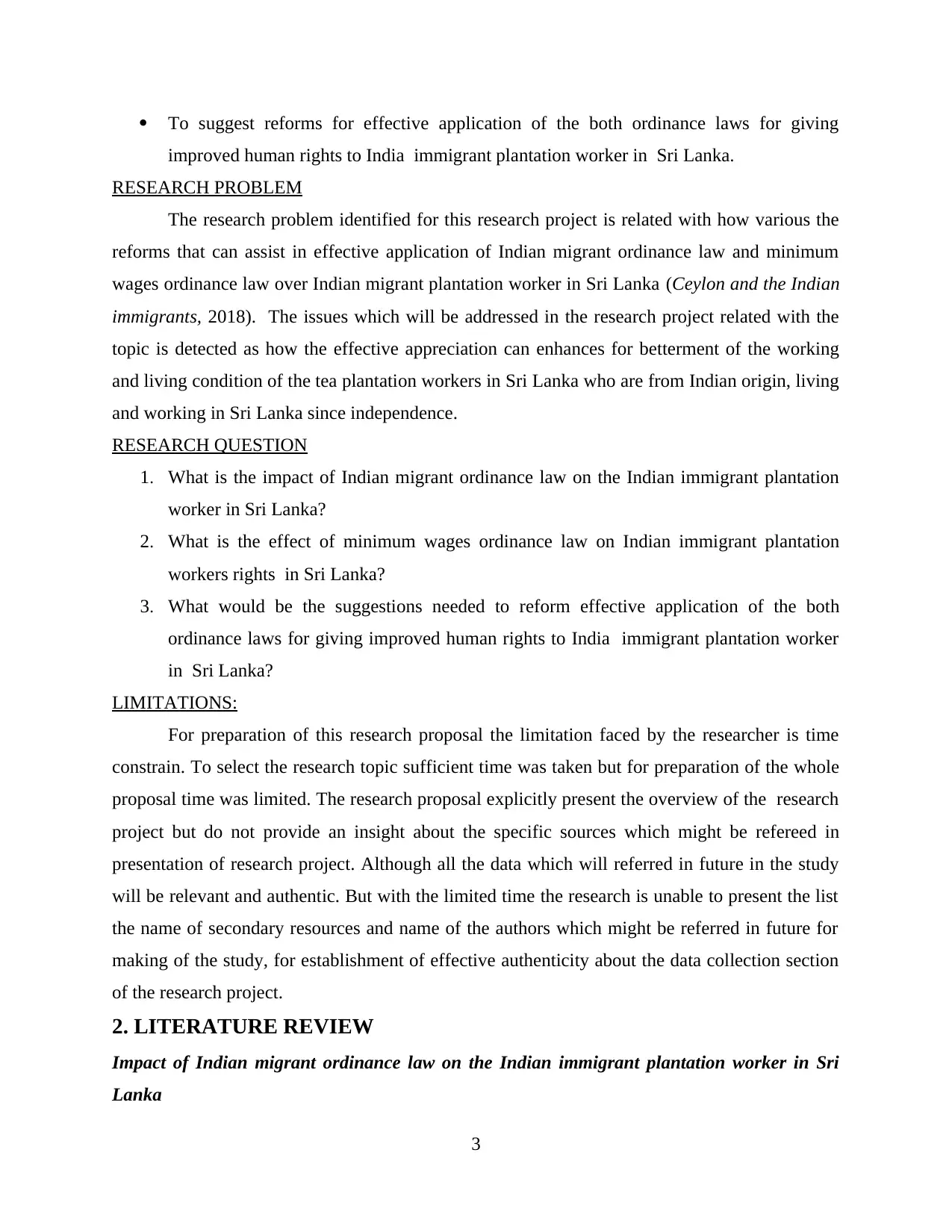
To suggest reforms for effective application of the both ordinance laws for giving
improved human rights to India immigrant plantation worker in Sri Lanka.
RESEARCH PROBLEM
The research problem identified for this research project is related with how various the
reforms that can assist in effective application of Indian migrant ordinance law and minimum
wages ordinance law over Indian migrant plantation worker in Sri Lanka (Ceylon and the Indian
immigrants, 2018). The issues which will be addressed in the research project related with the
topic is detected as how the effective appreciation can enhances for betterment of the working
and living condition of the tea plantation workers in Sri Lanka who are from Indian origin, living
and working in Sri Lanka since independence.
RESEARCH QUESTION
1. What is the impact of Indian migrant ordinance law on the Indian immigrant plantation
worker in Sri Lanka?
2. What is the effect of minimum wages ordinance law on Indian immigrant plantation
workers rights in Sri Lanka?
3. What would be the suggestions needed to reform effective application of the both
ordinance laws for giving improved human rights to India immigrant plantation worker
in Sri Lanka?
LIMITATIONS:
For preparation of this research proposal the limitation faced by the researcher is time
constrain. To select the research topic sufficient time was taken but for preparation of the whole
proposal time was limited. The research proposal explicitly present the overview of the research
project but do not provide an insight about the specific sources which might be refereed in
presentation of research project. Although all the data which will referred in future in the study
will be relevant and authentic. But with the limited time the research is unable to present the list
the name of secondary resources and name of the authors which might be referred in future for
making of the study, for establishment of effective authenticity about the data collection section
of the research project.
2. LITERATURE REVIEW
Impact of Indian migrant ordinance law on the Indian immigrant plantation worker in Sri
Lanka
3
improved human rights to India immigrant plantation worker in Sri Lanka.
RESEARCH PROBLEM
The research problem identified for this research project is related with how various the
reforms that can assist in effective application of Indian migrant ordinance law and minimum
wages ordinance law over Indian migrant plantation worker in Sri Lanka (Ceylon and the Indian
immigrants, 2018). The issues which will be addressed in the research project related with the
topic is detected as how the effective appreciation can enhances for betterment of the working
and living condition of the tea plantation workers in Sri Lanka who are from Indian origin, living
and working in Sri Lanka since independence.
RESEARCH QUESTION
1. What is the impact of Indian migrant ordinance law on the Indian immigrant plantation
worker in Sri Lanka?
2. What is the effect of minimum wages ordinance law on Indian immigrant plantation
workers rights in Sri Lanka?
3. What would be the suggestions needed to reform effective application of the both
ordinance laws for giving improved human rights to India immigrant plantation worker
in Sri Lanka?
LIMITATIONS:
For preparation of this research proposal the limitation faced by the researcher is time
constrain. To select the research topic sufficient time was taken but for preparation of the whole
proposal time was limited. The research proposal explicitly present the overview of the research
project but do not provide an insight about the specific sources which might be refereed in
presentation of research project. Although all the data which will referred in future in the study
will be relevant and authentic. But with the limited time the research is unable to present the list
the name of secondary resources and name of the authors which might be referred in future for
making of the study, for establishment of effective authenticity about the data collection section
of the research project.
2. LITERATURE REVIEW
Impact of Indian migrant ordinance law on the Indian immigrant plantation worker in Sri
Lanka
3
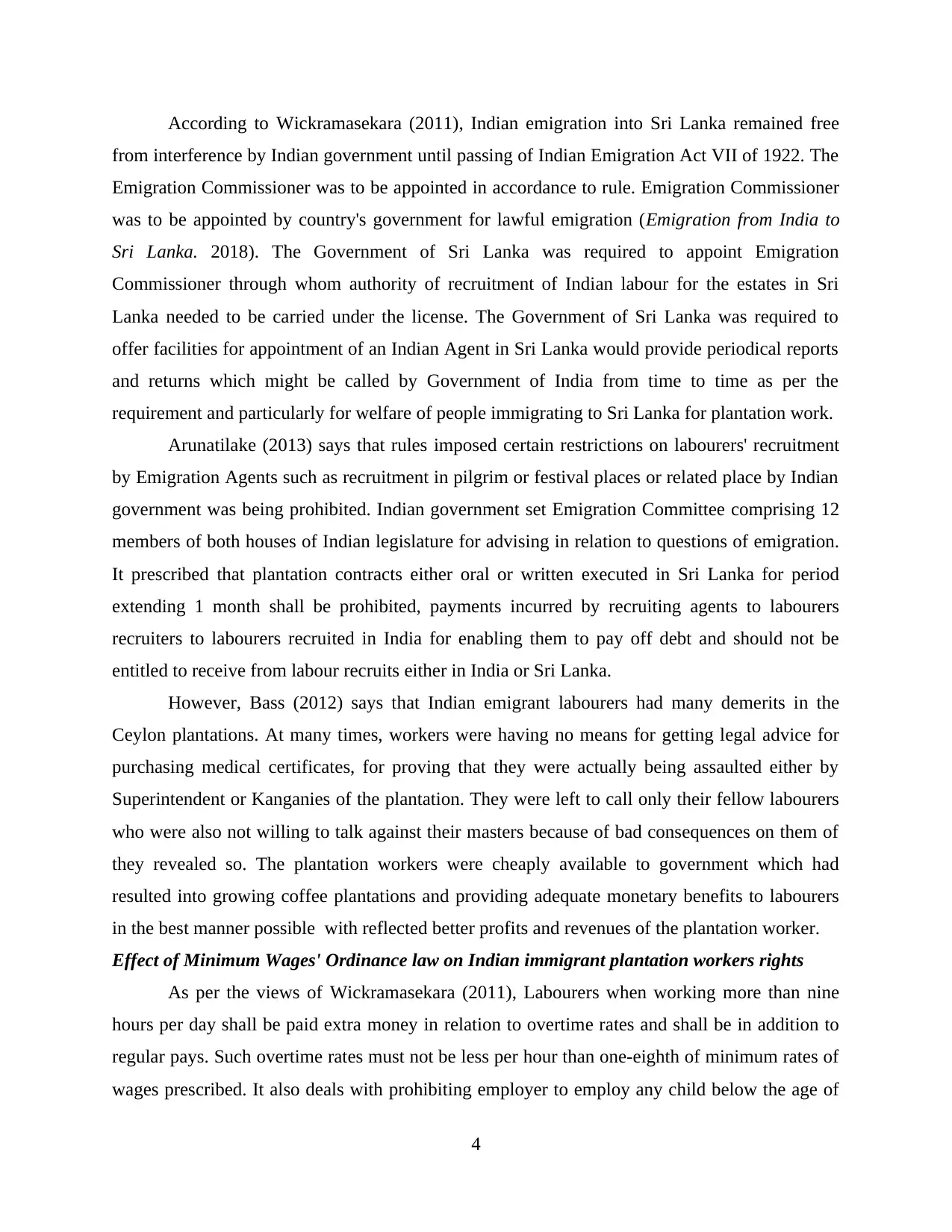
According to Wickramasekara (2011), Indian emigration into Sri Lanka remained free
from interference by Indian government until passing of Indian Emigration Act VII of 1922. The
Emigration Commissioner was to be appointed in accordance to rule. Emigration Commissioner
was to be appointed by country's government for lawful emigration (Emigration from India to
Sri Lanka. 2018). The Government of Sri Lanka was required to appoint Emigration
Commissioner through whom authority of recruitment of Indian labour for the estates in Sri
Lanka needed to be carried under the license. The Government of Sri Lanka was required to
offer facilities for appointment of an Indian Agent in Sri Lanka would provide periodical reports
and returns which might be called by Government of India from time to time as per the
requirement and particularly for welfare of people immigrating to Sri Lanka for plantation work.
Arunatilake (2013) says that rules imposed certain restrictions on labourers' recruitment
by Emigration Agents such as recruitment in pilgrim or festival places or related place by Indian
government was being prohibited. Indian government set Emigration Committee comprising 12
members of both houses of Indian legislature for advising in relation to questions of emigration.
It prescribed that plantation contracts either oral or written executed in Sri Lanka for period
extending 1 month shall be prohibited, payments incurred by recruiting agents to labourers
recruiters to labourers recruited in India for enabling them to pay off debt and should not be
entitled to receive from labour recruits either in India or Sri Lanka.
However, Bass (2012) says that Indian emigrant labourers had many demerits in the
Ceylon plantations. At many times, workers were having no means for getting legal advice for
purchasing medical certificates, for proving that they were actually being assaulted either by
Superintendent or Kanganies of the plantation. They were left to call only their fellow labourers
who were also not willing to talk against their masters because of bad consequences on them of
they revealed so. The plantation workers were cheaply available to government which had
resulted into growing coffee plantations and providing adequate monetary benefits to labourers
in the best manner possible with reflected better profits and revenues of the plantation worker.
Effect of Minimum Wages' Ordinance law on Indian immigrant plantation workers rights
As per the views of Wickramasekara (2011), Labourers when working more than nine
hours per day shall be paid extra money in relation to overtime rates and shall be in addition to
regular pays. Such overtime rates must not be less per hour than one-eighth of minimum rates of
wages prescribed. It also deals with prohibiting employer to employ any child below the age of
4
from interference by Indian government until passing of Indian Emigration Act VII of 1922. The
Emigration Commissioner was to be appointed in accordance to rule. Emigration Commissioner
was to be appointed by country's government for lawful emigration (Emigration from India to
Sri Lanka. 2018). The Government of Sri Lanka was required to appoint Emigration
Commissioner through whom authority of recruitment of Indian labour for the estates in Sri
Lanka needed to be carried under the license. The Government of Sri Lanka was required to
offer facilities for appointment of an Indian Agent in Sri Lanka would provide periodical reports
and returns which might be called by Government of India from time to time as per the
requirement and particularly for welfare of people immigrating to Sri Lanka for plantation work.
Arunatilake (2013) says that rules imposed certain restrictions on labourers' recruitment
by Emigration Agents such as recruitment in pilgrim or festival places or related place by Indian
government was being prohibited. Indian government set Emigration Committee comprising 12
members of both houses of Indian legislature for advising in relation to questions of emigration.
It prescribed that plantation contracts either oral or written executed in Sri Lanka for period
extending 1 month shall be prohibited, payments incurred by recruiting agents to labourers
recruiters to labourers recruited in India for enabling them to pay off debt and should not be
entitled to receive from labour recruits either in India or Sri Lanka.
However, Bass (2012) says that Indian emigrant labourers had many demerits in the
Ceylon plantations. At many times, workers were having no means for getting legal advice for
purchasing medical certificates, for proving that they were actually being assaulted either by
Superintendent or Kanganies of the plantation. They were left to call only their fellow labourers
who were also not willing to talk against their masters because of bad consequences on them of
they revealed so. The plantation workers were cheaply available to government which had
resulted into growing coffee plantations and providing adequate monetary benefits to labourers
in the best manner possible with reflected better profits and revenues of the plantation worker.
Effect of Minimum Wages' Ordinance law on Indian immigrant plantation workers rights
As per the views of Wickramasekara (2011), Labourers when working more than nine
hours per day shall be paid extra money in relation to overtime rates and shall be in addition to
regular pays. Such overtime rates must not be less per hour than one-eighth of minimum rates of
wages prescribed. It also deals with prohibiting employer to employ any child below the age of
4
⊘ This is a preview!⊘
Do you want full access?
Subscribe today to unlock all pages.

Trusted by 1+ million students worldwide
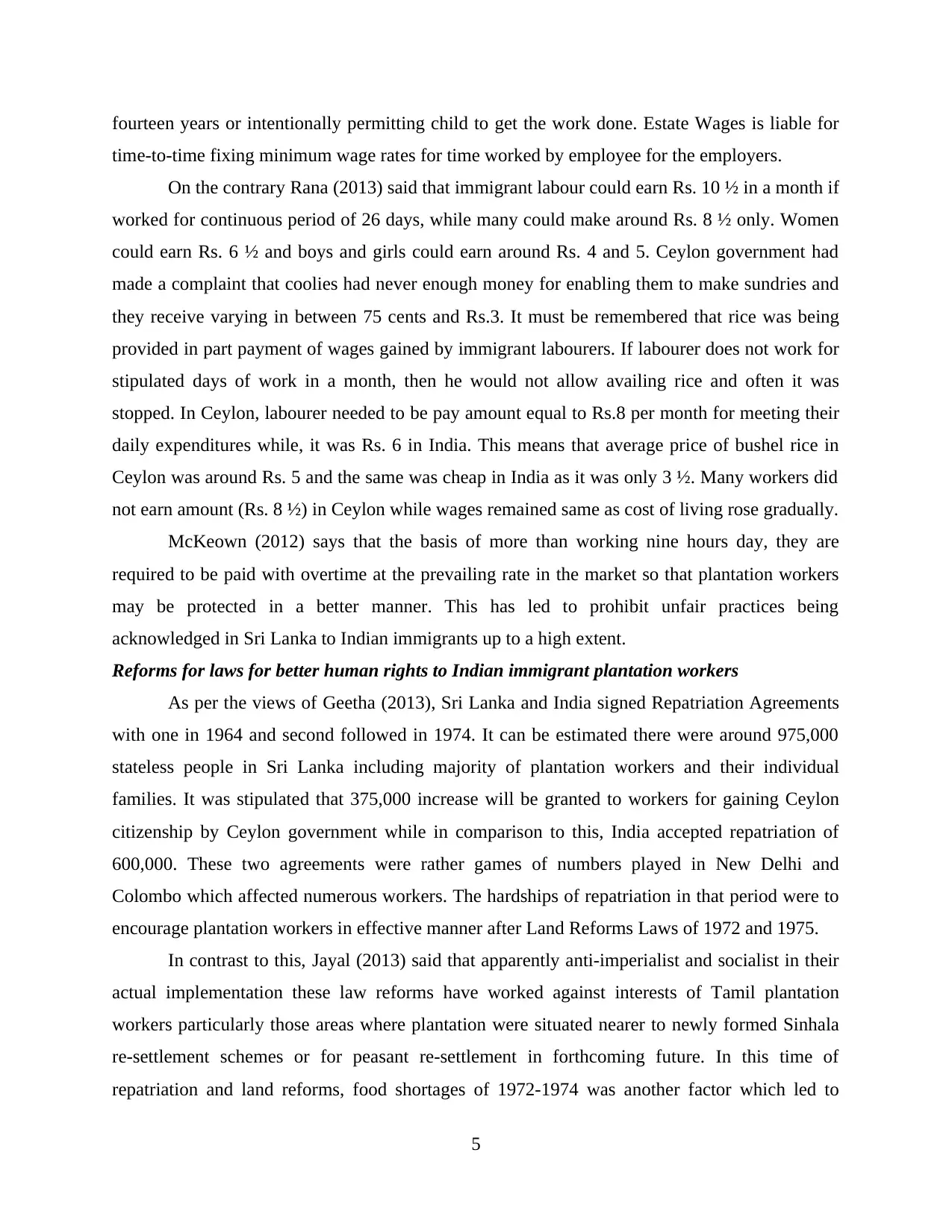
fourteen years or intentionally permitting child to get the work done. Estate Wages is liable for
time-to-time fixing minimum wage rates for time worked by employee for the employers.
On the contrary Rana (2013) said that immigrant labour could earn Rs. 10 ½ in a month if
worked for continuous period of 26 days, while many could make around Rs. 8 ½ only. Women
could earn Rs. 6 ½ and boys and girls could earn around Rs. 4 and 5. Ceylon government had
made a complaint that coolies had never enough money for enabling them to make sundries and
they receive varying in between 75 cents and Rs.3. It must be remembered that rice was being
provided in part payment of wages gained by immigrant labourers. If labourer does not work for
stipulated days of work in a month, then he would not allow availing rice and often it was
stopped. In Ceylon, labourer needed to be pay amount equal to Rs.8 per month for meeting their
daily expenditures while, it was Rs. 6 in India. This means that average price of bushel rice in
Ceylon was around Rs. 5 and the same was cheap in India as it was only 3 ½. Many workers did
not earn amount (Rs. 8 ½) in Ceylon while wages remained same as cost of living rose gradually.
McKeown (2012) says that the basis of more than working nine hours day, they are
required to be paid with overtime at the prevailing rate in the market so that plantation workers
may be protected in a better manner. This has led to prohibit unfair practices being
acknowledged in Sri Lanka to Indian immigrants up to a high extent.
Reforms for laws for better human rights to Indian immigrant plantation workers
As per the views of Geetha (2013), Sri Lanka and India signed Repatriation Agreements
with one in 1964 and second followed in 1974. It can be estimated there were around 975,000
stateless people in Sri Lanka including majority of plantation workers and their individual
families. It was stipulated that 375,000 increase will be granted to workers for gaining Ceylon
citizenship by Ceylon government while in comparison to this, India accepted repatriation of
600,000. These two agreements were rather games of numbers played in New Delhi and
Colombo which affected numerous workers. The hardships of repatriation in that period were to
encourage plantation workers in effective manner after Land Reforms Laws of 1972 and 1975.
In contrast to this, Jayal (2013) said that apparently anti-imperialist and socialist in their
actual implementation these law reforms have worked against interests of Tamil plantation
workers particularly those areas where plantation were situated nearer to newly formed Sinhala
re-settlement schemes or for peasant re-settlement in forthcoming future. In this time of
repatriation and land reforms, food shortages of 1972-1974 was another factor which led to
5
time-to-time fixing minimum wage rates for time worked by employee for the employers.
On the contrary Rana (2013) said that immigrant labour could earn Rs. 10 ½ in a month if
worked for continuous period of 26 days, while many could make around Rs. 8 ½ only. Women
could earn Rs. 6 ½ and boys and girls could earn around Rs. 4 and 5. Ceylon government had
made a complaint that coolies had never enough money for enabling them to make sundries and
they receive varying in between 75 cents and Rs.3. It must be remembered that rice was being
provided in part payment of wages gained by immigrant labourers. If labourer does not work for
stipulated days of work in a month, then he would not allow availing rice and often it was
stopped. In Ceylon, labourer needed to be pay amount equal to Rs.8 per month for meeting their
daily expenditures while, it was Rs. 6 in India. This means that average price of bushel rice in
Ceylon was around Rs. 5 and the same was cheap in India as it was only 3 ½. Many workers did
not earn amount (Rs. 8 ½) in Ceylon while wages remained same as cost of living rose gradually.
McKeown (2012) says that the basis of more than working nine hours day, they are
required to be paid with overtime at the prevailing rate in the market so that plantation workers
may be protected in a better manner. This has led to prohibit unfair practices being
acknowledged in Sri Lanka to Indian immigrants up to a high extent.
Reforms for laws for better human rights to Indian immigrant plantation workers
As per the views of Geetha (2013), Sri Lanka and India signed Repatriation Agreements
with one in 1964 and second followed in 1974. It can be estimated there were around 975,000
stateless people in Sri Lanka including majority of plantation workers and their individual
families. It was stipulated that 375,000 increase will be granted to workers for gaining Ceylon
citizenship by Ceylon government while in comparison to this, India accepted repatriation of
600,000. These two agreements were rather games of numbers played in New Delhi and
Colombo which affected numerous workers. The hardships of repatriation in that period were to
encourage plantation workers in effective manner after Land Reforms Laws of 1972 and 1975.
In contrast to this, Jayal (2013) said that apparently anti-imperialist and socialist in their
actual implementation these law reforms have worked against interests of Tamil plantation
workers particularly those areas where plantation were situated nearer to newly formed Sinhala
re-settlement schemes or for peasant re-settlement in forthcoming future. In this time of
repatriation and land reforms, food shortages of 1972-1974 was another factor which led to
5
Paraphrase This Document
Need a fresh take? Get an instant paraphrase of this document with our AI Paraphraser
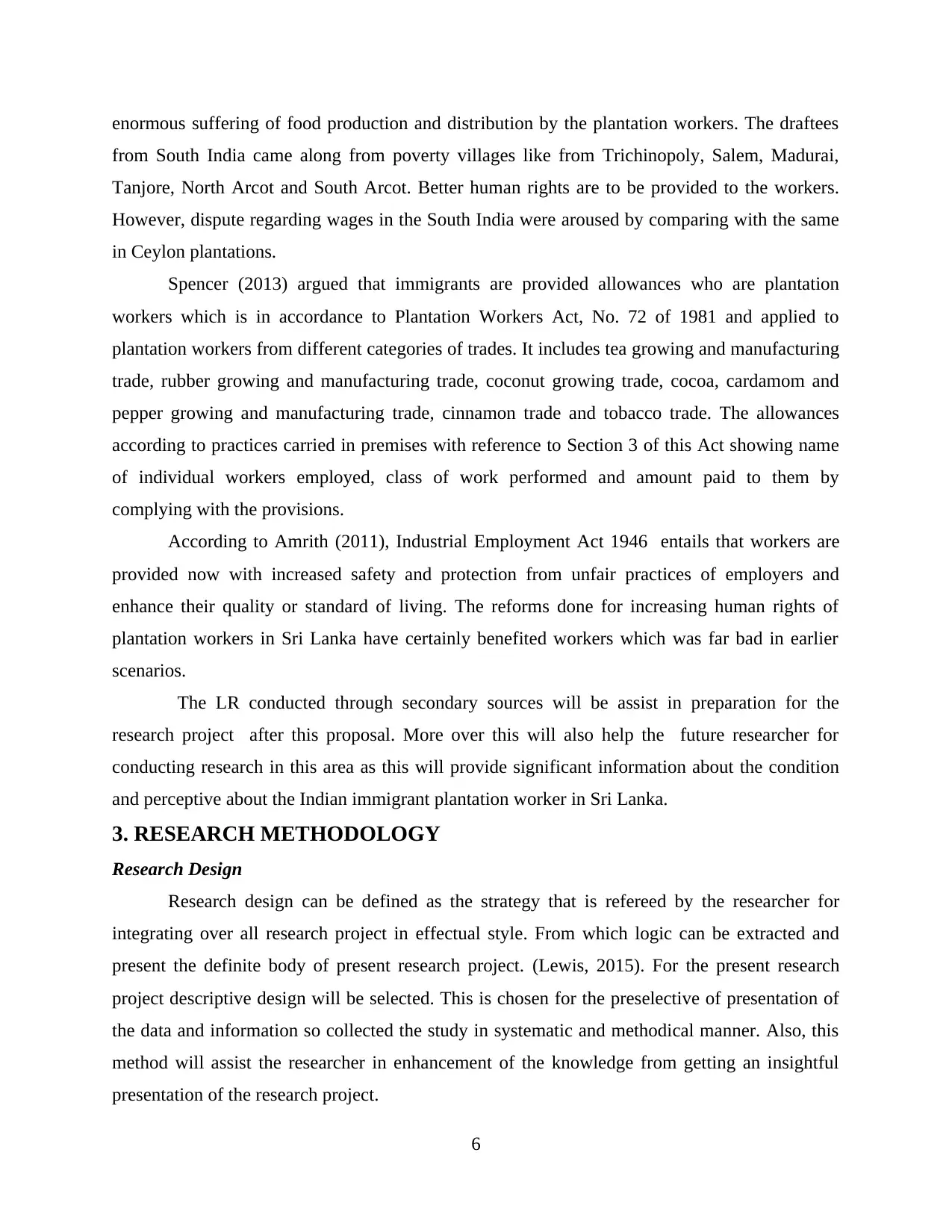
enormous suffering of food production and distribution by the plantation workers. The draftees
from South India came along from poverty villages like from Trichinopoly, Salem, Madurai,
Tanjore, North Arcot and South Arcot. Better human rights are to be provided to the workers.
However, dispute regarding wages in the South India were aroused by comparing with the same
in Ceylon plantations.
Spencer (2013) argued that immigrants are provided allowances who are plantation
workers which is in accordance to Plantation Workers Act, No. 72 of 1981 and applied to
plantation workers from different categories of trades. It includes tea growing and manufacturing
trade, rubber growing and manufacturing trade, coconut growing trade, cocoa, cardamom and
pepper growing and manufacturing trade, cinnamon trade and tobacco trade. The allowances
according to practices carried in premises with reference to Section 3 of this Act showing name
of individual workers employed, class of work performed and amount paid to them by
complying with the provisions.
According to Amrith (2011), Industrial Employment Act 1946 entails that workers are
provided now with increased safety and protection from unfair practices of employers and
enhance their quality or standard of living. The reforms done for increasing human rights of
plantation workers in Sri Lanka have certainly benefited workers which was far bad in earlier
scenarios.
The LR conducted through secondary sources will be assist in preparation for the
research project after this proposal. More over this will also help the future researcher for
conducting research in this area as this will provide significant information about the condition
and perceptive about the Indian immigrant plantation worker in Sri Lanka.
3. RESEARCH METHODOLOGY
Research Design
Research design can be defined as the strategy that is refereed by the researcher for
integrating over all research project in effectual style. From which logic can be extracted and
present the definite body of present research project. (Lewis, 2015). For the present research
project descriptive design will be selected. This is chosen for the preselective of presentation of
the data and information so collected the study in systematic and methodical manner. Also, this
method will assist the researcher in enhancement of the knowledge from getting an insightful
presentation of the research project.
6
from South India came along from poverty villages like from Trichinopoly, Salem, Madurai,
Tanjore, North Arcot and South Arcot. Better human rights are to be provided to the workers.
However, dispute regarding wages in the South India were aroused by comparing with the same
in Ceylon plantations.
Spencer (2013) argued that immigrants are provided allowances who are plantation
workers which is in accordance to Plantation Workers Act, No. 72 of 1981 and applied to
plantation workers from different categories of trades. It includes tea growing and manufacturing
trade, rubber growing and manufacturing trade, coconut growing trade, cocoa, cardamom and
pepper growing and manufacturing trade, cinnamon trade and tobacco trade. The allowances
according to practices carried in premises with reference to Section 3 of this Act showing name
of individual workers employed, class of work performed and amount paid to them by
complying with the provisions.
According to Amrith (2011), Industrial Employment Act 1946 entails that workers are
provided now with increased safety and protection from unfair practices of employers and
enhance their quality or standard of living. The reforms done for increasing human rights of
plantation workers in Sri Lanka have certainly benefited workers which was far bad in earlier
scenarios.
The LR conducted through secondary sources will be assist in preparation for the
research project after this proposal. More over this will also help the future researcher for
conducting research in this area as this will provide significant information about the condition
and perceptive about the Indian immigrant plantation worker in Sri Lanka.
3. RESEARCH METHODOLOGY
Research Design
Research design can be defined as the strategy that is refereed by the researcher for
integrating over all research project in effectual style. From which logic can be extracted and
present the definite body of present research project. (Lewis, 2015). For the present research
project descriptive design will be selected. This is chosen for the preselective of presentation of
the data and information so collected the study in systematic and methodical manner. Also, this
method will assist the researcher in enhancement of the knowledge from getting an insightful
presentation of the research project.
6
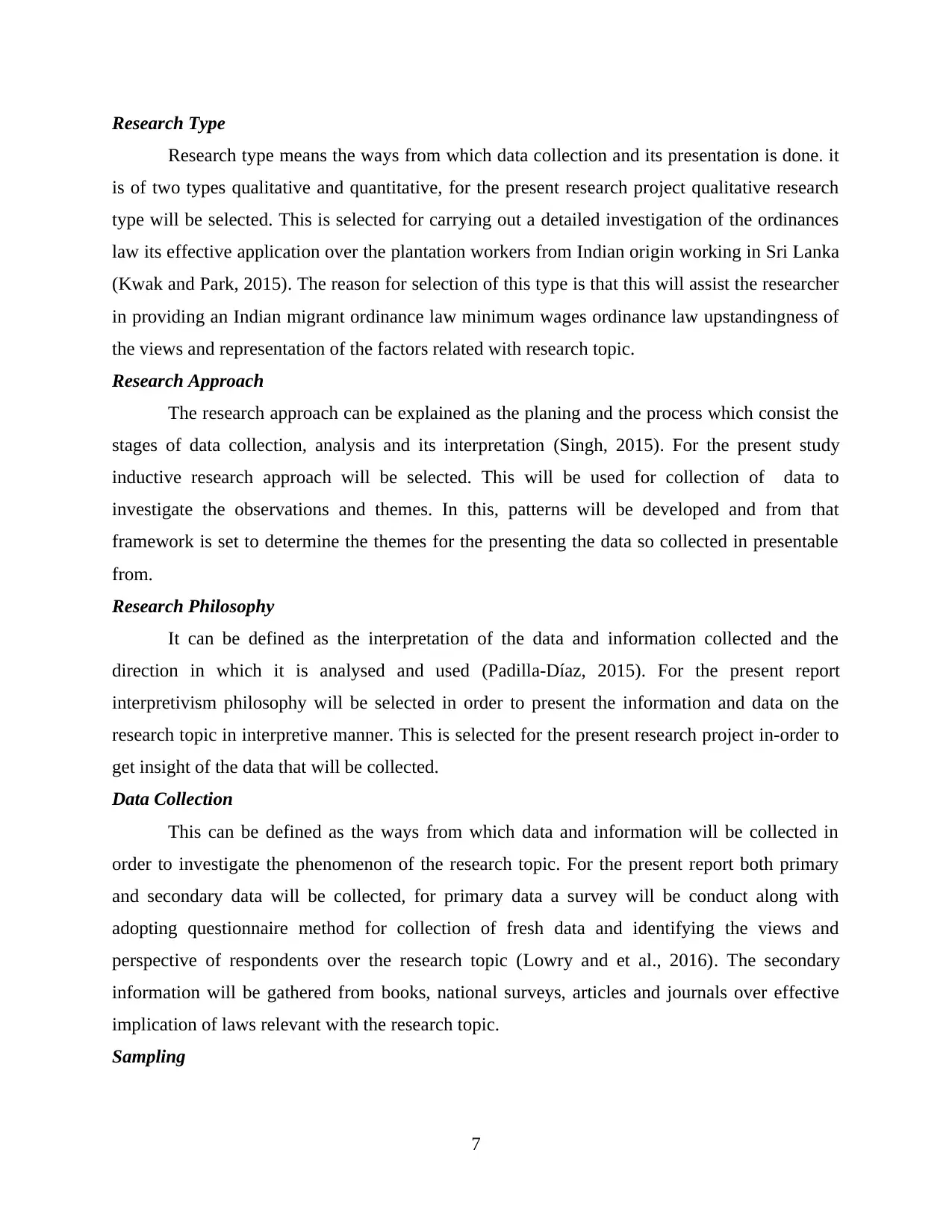
Research Type
Research type means the ways from which data collection and its presentation is done. it
is of two types qualitative and quantitative, for the present research project qualitative research
type will be selected. This is selected for carrying out a detailed investigation of the ordinances
law its effective application over the plantation workers from Indian origin working in Sri Lanka
(Kwak and Park, 2015). The reason for selection of this type is that this will assist the researcher
in providing an Indian migrant ordinance law minimum wages ordinance law upstandingness of
the views and representation of the factors related with research topic.
Research Approach
The research approach can be explained as the planing and the process which consist the
stages of data collection, analysis and its interpretation (Singh, 2015). For the present study
inductive research approach will be selected. This will be used for collection of data to
investigate the observations and themes. In this, patterns will be developed and from that
framework is set to determine the themes for the presenting the data so collected in presentable
from.
Research Philosophy
It can be defined as the interpretation of the data and information collected and the
direction in which it is analysed and used (Padilla-Díaz, 2015). For the present report
interpretivism philosophy will be selected in order to present the information and data on the
research topic in interpretive manner. This is selected for the present research project in-order to
get insight of the data that will be collected.
Data Collection
This can be defined as the ways from which data and information will be collected in
order to investigate the phenomenon of the research topic. For the present report both primary
and secondary data will be collected, for primary data a survey will be conduct along with
adopting questionnaire method for collection of fresh data and identifying the views and
perspective of respondents over the research topic (Lowry and et al., 2016). The secondary
information will be gathered from books, national surveys, articles and journals over effective
implication of laws relevant with the research topic.
Sampling
7
Research type means the ways from which data collection and its presentation is done. it
is of two types qualitative and quantitative, for the present research project qualitative research
type will be selected. This is selected for carrying out a detailed investigation of the ordinances
law its effective application over the plantation workers from Indian origin working in Sri Lanka
(Kwak and Park, 2015). The reason for selection of this type is that this will assist the researcher
in providing an Indian migrant ordinance law minimum wages ordinance law upstandingness of
the views and representation of the factors related with research topic.
Research Approach
The research approach can be explained as the planing and the process which consist the
stages of data collection, analysis and its interpretation (Singh, 2015). For the present study
inductive research approach will be selected. This will be used for collection of data to
investigate the observations and themes. In this, patterns will be developed and from that
framework is set to determine the themes for the presenting the data so collected in presentable
from.
Research Philosophy
It can be defined as the interpretation of the data and information collected and the
direction in which it is analysed and used (Padilla-Díaz, 2015). For the present report
interpretivism philosophy will be selected in order to present the information and data on the
research topic in interpretive manner. This is selected for the present research project in-order to
get insight of the data that will be collected.
Data Collection
This can be defined as the ways from which data and information will be collected in
order to investigate the phenomenon of the research topic. For the present report both primary
and secondary data will be collected, for primary data a survey will be conduct along with
adopting questionnaire method for collection of fresh data and identifying the views and
perspective of respondents over the research topic (Lowry and et al., 2016). The secondary
information will be gathered from books, national surveys, articles and journals over effective
implication of laws relevant with the research topic.
Sampling
7
⊘ This is a preview!⊘
Do you want full access?
Subscribe today to unlock all pages.

Trusted by 1+ million students worldwide
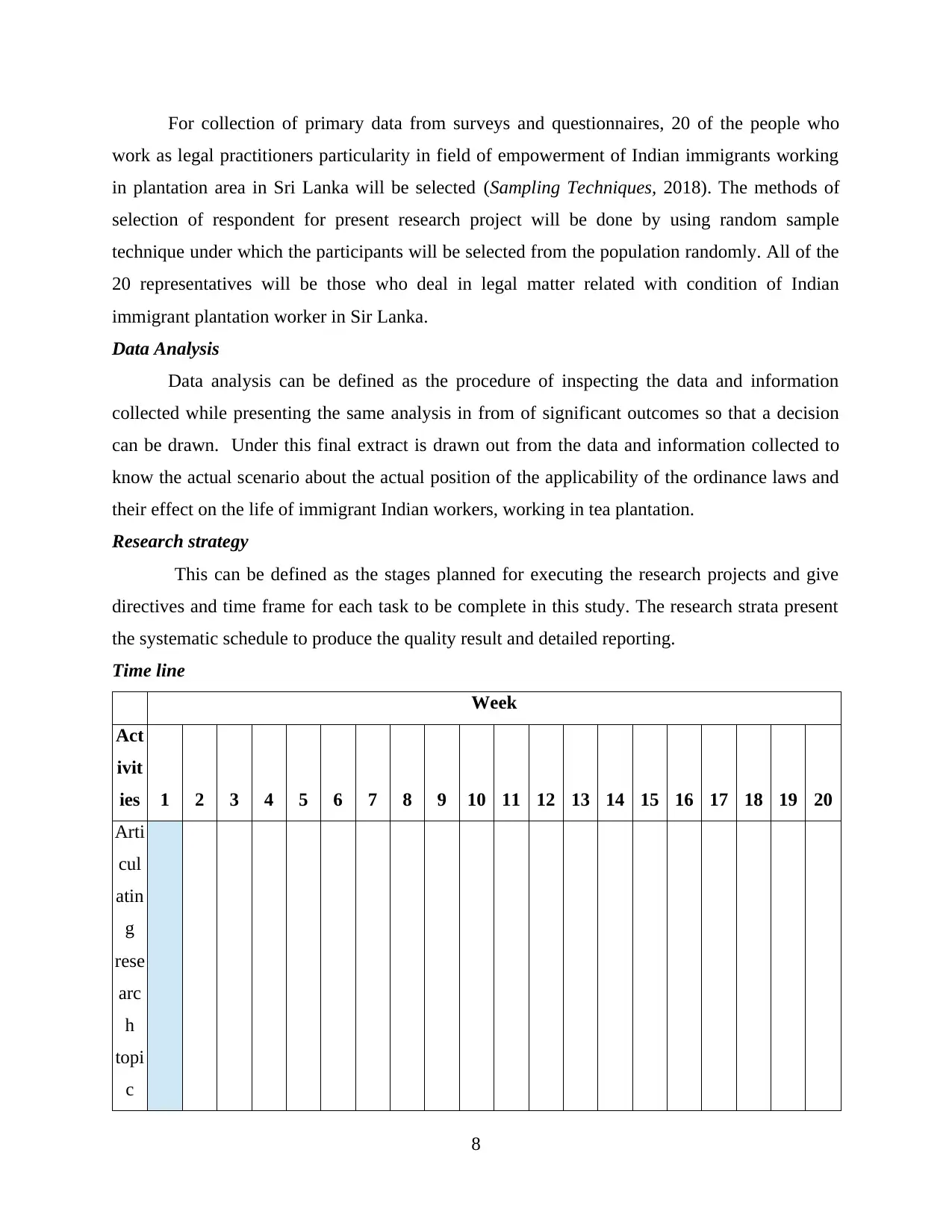
For collection of primary data from surveys and questionnaires, 20 of the people who
work as legal practitioners particularity in field of empowerment of Indian immigrants working
in plantation area in Sri Lanka will be selected (Sampling Techniques, 2018). The methods of
selection of respondent for present research project will be done by using random sample
technique under which the participants will be selected from the population randomly. All of the
20 representatives will be those who deal in legal matter related with condition of Indian
immigrant plantation worker in Sir Lanka.
Data Analysis
Data analysis can be defined as the procedure of inspecting the data and information
collected while presenting the same analysis in from of significant outcomes so that a decision
can be drawn. Under this final extract is drawn out from the data and information collected to
know the actual scenario about the actual position of the applicability of the ordinance laws and
their effect on the life of immigrant Indian workers, working in tea plantation.
Research strategy
This can be defined as the stages planned for executing the research projects and give
directives and time frame for each task to be complete in this study. The research strata present
the systematic schedule to produce the quality result and detailed reporting.
Time line
Week
Act
ivit
ies 1 2 3 4 5 6 7 8 9 10 11 12 13 14 15 16 17 18 19 20
Arti
cul
atin
g
rese
arc
h
topi
c
8
work as legal practitioners particularity in field of empowerment of Indian immigrants working
in plantation area in Sri Lanka will be selected (Sampling Techniques, 2018). The methods of
selection of respondent for present research project will be done by using random sample
technique under which the participants will be selected from the population randomly. All of the
20 representatives will be those who deal in legal matter related with condition of Indian
immigrant plantation worker in Sir Lanka.
Data Analysis
Data analysis can be defined as the procedure of inspecting the data and information
collected while presenting the same analysis in from of significant outcomes so that a decision
can be drawn. Under this final extract is drawn out from the data and information collected to
know the actual scenario about the actual position of the applicability of the ordinance laws and
their effect on the life of immigrant Indian workers, working in tea plantation.
Research strategy
This can be defined as the stages planned for executing the research projects and give
directives and time frame for each task to be complete in this study. The research strata present
the systematic schedule to produce the quality result and detailed reporting.
Time line
Week
Act
ivit
ies 1 2 3 4 5 6 7 8 9 10 11 12 13 14 15 16 17 18 19 20
Arti
cul
atin
g
rese
arc
h
topi
c
8
Paraphrase This Document
Need a fresh take? Get an instant paraphrase of this document with our AI Paraphraser
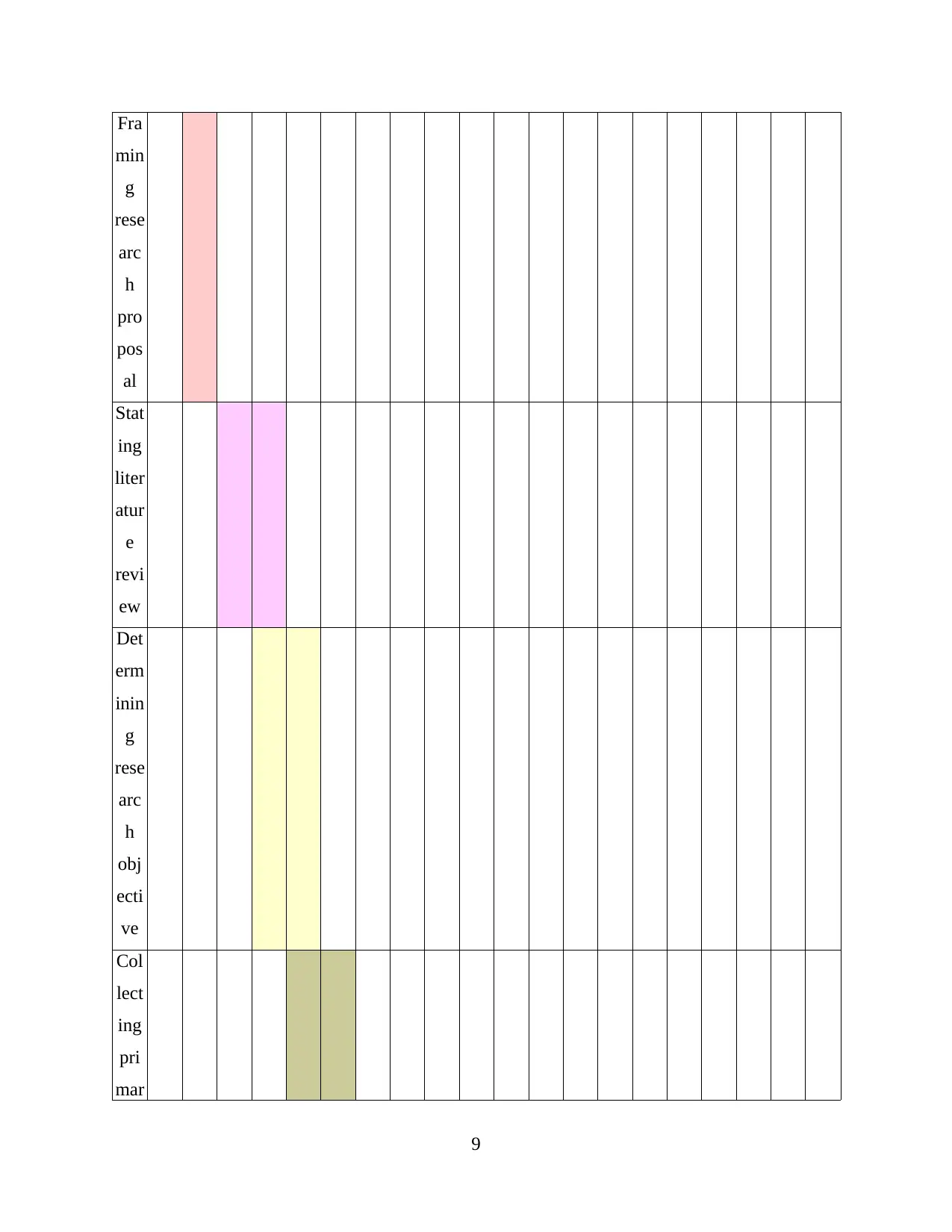
Fra
min
g
rese
arc
h
pro
pos
al
Stat
ing
liter
atur
e
revi
ew
Det
erm
inin
g
rese
arc
h
obj
ecti
ve
Col
lect
ing
pri
mar
9
min
g
rese
arc
h
pro
pos
al
Stat
ing
liter
atur
e
revi
ew
Det
erm
inin
g
rese
arc
h
obj
ecti
ve
Col
lect
ing
pri
mar
9
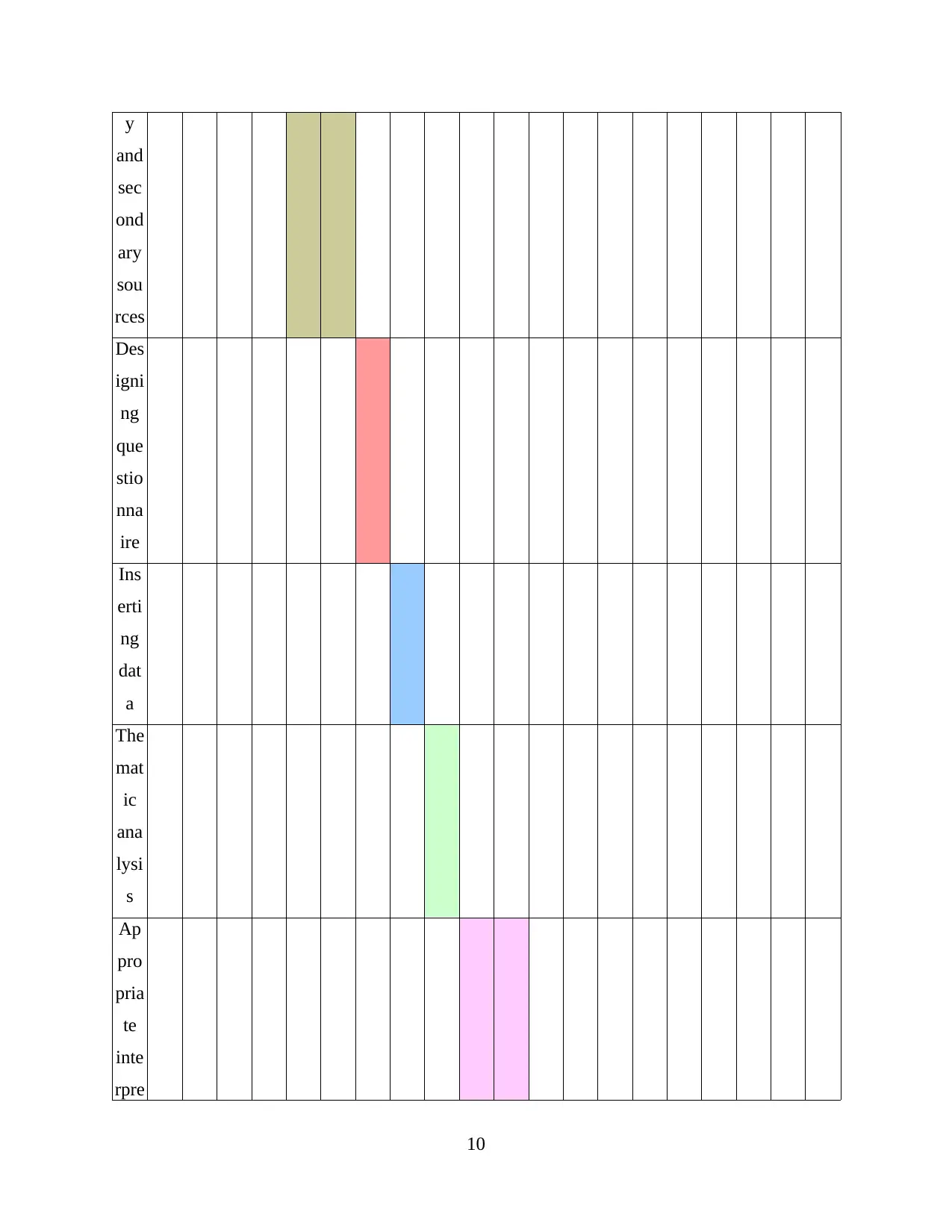
y
and
sec
ond
ary
sou
rces
Des
igni
ng
que
stio
nna
ire
Ins
erti
ng
dat
a
The
mat
ic
ana
lysi
s
Ap
pro
pria
te
inte
rpre
10
and
sec
ond
ary
sou
rces
Des
igni
ng
que
stio
nna
ire
Ins
erti
ng
dat
a
The
mat
ic
ana
lysi
s
Ap
pro
pria
te
inte
rpre
10
⊘ This is a preview!⊘
Do you want full access?
Subscribe today to unlock all pages.

Trusted by 1+ million students worldwide
1 out of 15
Your All-in-One AI-Powered Toolkit for Academic Success.
+13062052269
info@desklib.com
Available 24*7 on WhatsApp / Email
![[object Object]](/_next/static/media/star-bottom.7253800d.svg)
Unlock your academic potential
Copyright © 2020–2025 A2Z Services. All Rights Reserved. Developed and managed by ZUCOL.

